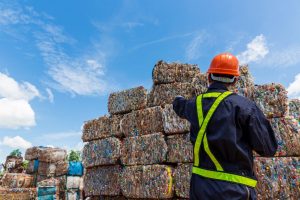
The development of our modern world comes with its many comforts. We build, produce and create products and services our ancestors couldn’t have even imagined, yet our progress comes at a cost. The price we have to pay is measured in the waste our industrial processes and everyday consumption produce.
Waste management is a critical issue in the global economy, one that we’re still struggling to handle responsibly. The future of our planet and future generations lies in our hands. Sustainable waste management is a pressing issue we have to resolve as soon as possible.
In this article, we’ll take a look at how we as a global society are preparing for the future of trash. But first, let’s start with the foundations.

Waste management is the collection, transportation, and disposal of garbage, sewage, and other waste products. It involves the treatment of solid and liquid waste. It’s in the treatment phase that part of our trash can be recycled. The statistics on recycling, however, show that just a tiny fraction of the waste we produce is recycled. For example, only 5% to 6% of post-consumer plastics have been recycled in 2021.

The world generates more than 2 billion tons of waste per year. In another 28 years, the amount of waste is estimated to grow to 3.4 billion tons, an increase that needs addressing. Intertwining our economic systems into one harmonious recycling and reusing society, however, isn’t an easy task. Even more so, when the expected rise of world economies and population growth in lower to middle-income countries will affect the production and management of waste.
By 2050, in the regions of Sub-Saharan Africa and South Asia, the total waste generation is expected to triple, accounting for 35% of the world’s waste. This will exacerbate the problem created by big consumer countries like the US, where each person produces almost 1800 lbs of waste annually. Looking for sustainable ways to manage our waste is a pressing challenge that we should take seriously.

Sustainability is the practice of responsible consumption of natural resources so we prevent their depletion. It looks at methods of maintaining the ecological balance. In business terms, sustainability is reflected through the manufacturing of goods and services that do not damage the environment and in the best case can be returned back into the production cycle.

Sustainable waste management relates to the collection, transportation, and disposal of waste in ways that the environment is not jeopardized. The idea of sustainable waste management boils down to re-using trash as an essential resource, vital for households and businesses.
Sustainable waste management is tasked with decreasing the use of precious natural resources – a massive undertaking that aims to focus our efforts on reusing responsibly what we’ve already manufactured. As part of the circular economy concept, a well-designed sustainable waste management system incorporates feedback loops, focuses on processes, and adaptability, and successfully diverts waste from dumping grounds.
Sustainable waste management besides being good for the environment provides opportunities and benefits to society and the global economy. Responsible waste management can create jobs, and lessen the harmful impact of human activities hence, improving the air and water quality. Additionally, it decreases food wastage and lowers environmental costs.
Legislative systems around the globe are already taking proper steps toward creating regulations that encourage businesses and people to reduce their waste, and take advantage of alternative energy sources, so together we can meet our growing demands in a sustainable way. Developing technologies offer practical solutions that can help us bring our waste into the future.
One such technology is Waste to Energy (WTE). The idea of WTE is partially pushed by the rapid depletion of conventional energy sources but is also a solution to the increasing implementation of environmental policies, like the need to reduce carbon emissions.

Waste to Energy technology addresses processes that create energy like electricity, transport fuels, or heat from waste. There are several types of WTE. New resources can be generated from semi-solid waste (like sludge), liquid waste (like domestic sewage), and gaseous waste (like refinery gas).
Waste to energy is most commonly applied to the processing of municipal solid waste, where incinerating the trash collected by businesses and households produces heat and power in CHP plants. It’s an alternative that helps lower harmful emissions from landfills and it also recovers important and limited metals through recycling.
Although current WTE technologies help us offset some of the impacts our waste has on the environment, there is still work to be done for us to transition to a fully sustainable waste management future. Here are a few ideas that will help us move forward.
It all comes down to adjusting our processes and lives to a more conscientious manufacturing and consumerism. Two tasks that are easy in theory but far more complicated in practice.

Nonetheless, there are a few smart waste management solutions that might help us get there.
Recycling is one way to reduce our carbon footprint, but it’s a process that also requires the consumption of energy instead of trying to figure out how we can responsibly recycle single-use plastics and other single-use materials. For example, we can start investing our time in learning about sustainable materials and manufacturing processes that help us make greener choices. Turning biodegradable single-use cutlery into compost that nurtures the land and helps us grow more food is a great alternative.
Planning for waste management is probably not the most fun, as it calls for our concentrated effort to organize when and how to dispose of our trash. But it is an essential and repetitive task that should follow the entire process of returning what we’ve used back into the production cycle. This is a step that’s especially important to business owners who are fully dedicated to transforming their manufacturing methods and helping their consumers in the process.
Strategic planning will help you offer sustainable improvements to local waste management practices and adjust to the ever-changing waste and recovered materials markets. In addition, brands that show their engagement with such an important issue are far more likely to not only keep but grow their client base.
Significant social changes are hard, and they can rarely be achieved single-handedly. Collaboration is key to every major decision that drives our development and sustainable waste management is not an exception.
One approach that can help us achieve more in the field of responsible trash management is the Public-Private Partnerships for Service Delivery (PPPSD). PPPSD promotes self-supporting partnerships between different businesses and local governments. It’s a tool that regulators can use to employ private businesses in infrastructural and other services linked to the sustainable management of waste. This way our governments can benefit from the expertise and innovation of the private sector to deal with a growing issue, while at the same time offering opportunities to businesses to advance, and facilitate economic growth.
There are multiple additional benefits of such a type of collaboration like the minimized adverse effects of waste in lower-income communities; the sustainable improvement of waste management; and not least of all, the improved livelihood of people involved in the sustainable waste management processes.

“Waste not, want not. “
This proverb shows that people have long understood the importance of preserving and carefully spending the resources we have. Extravagant and careless use of public commodities with no regard for how to restore or conserve assets should no longer be an option. It’s time we start implementing practical solutions to a growing global issue that is affecting the environment and our own health. It’s time to reduce and reuse, it’s time for the future of trash.